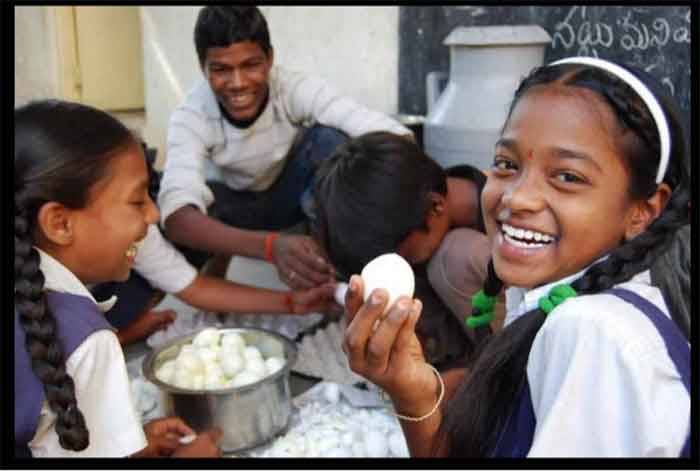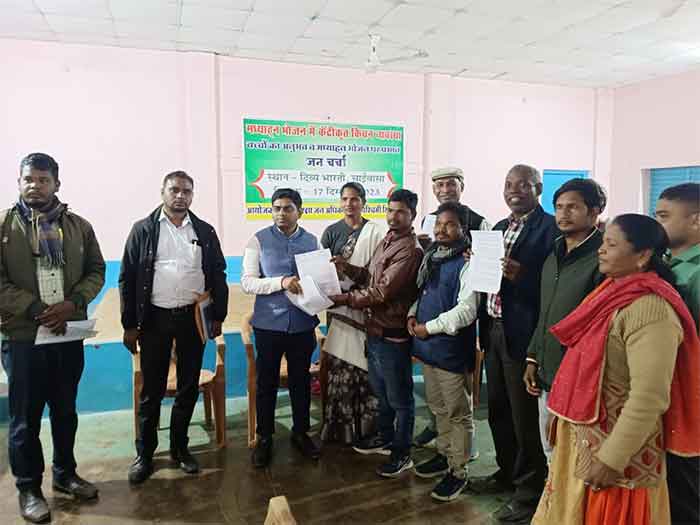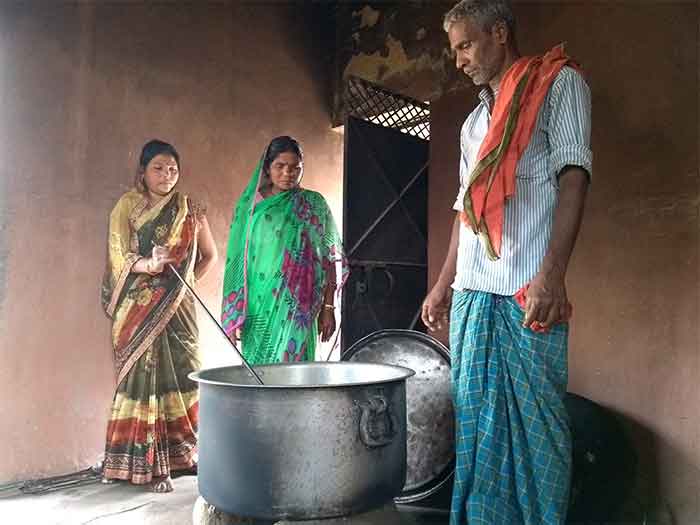
In the continuing misery being faced by children as policy-makers increasingly push for an agenda of vegetarianism that has never been endorsed or debated in a country consisting of largely non-vegetarian people. Through a report by an expert committee, headed by John Vijay Sagar, Professor and Head, Department of Child and Adolescent Psychiatry, NIMHANS on health, the New Education Policy Karnataka has once again opened up the debate on the merits of giving eggs to children in schools as part of the mid-day meal programme. In arguing for a ‘satvik’ diet for children, this report is not only completely unscientific and baseless but also casteist in denying people food choices.
In a bizarre recommendation, the report uses the rationale that eggs are high in cholesterol and therefore should not be included in a country where only about 3% of children had high cholesterol as per the recent CNNS report, while nearly 40% suffered from stunting.
In such a context, eggs provide many of the nutritional needs of children, including good quality proteins, iron, vitamins, and fats and are recommended by most nutritional experts in a population that is known to suffer from malnutrition, anemia and protein deficiency. They are tasty, affordable, simple to cook, and less vulnerable to adulteration and pilferage than other nutritious foods. There is also evidence that they increase school attendance in food-insecure sections of society. Moreover, current levels of consumption of eggs are quite low (due to reasons of affordability rather than preference) with data from the Comprehensive National Nutrition Survey (CNNS) 2016-18 data showing that only 16% of children in the age group of 2 to 4 years and 35% adolescents consumed eggs the previous day, whereas more than half the families interviewed claimed to have a preference for non-vegetarian diets.
The recent Global Nutrition Report 2021 also shows that 71 percent of Indians cannot afford a healthy diet. Even the latest State of Food Security and Nutrition report shows that the world is moving backward in efforts to eliminate hunger and malnutrition. Globally in 2020, among children under five years of age, an estimated 149 million (22 percent) were stunted,
45 million (6.7 percent) were wasted and 39 million (5.7 percent) were overweight. Although these reports can be further publicly debated and should not be treated as final.
The outcomes of the provision of eggs on childhood anemia and malnutrition are well understood and the denial of the role of non-vegetarian foods in strategies for combating these grave and persistent public health issues is inexplicable by nutrition science. In such a context, all efforts should be made to contribute to dietary diversity, including animal source foods, through school meals, Anganwadi and other public programmes. The continued exclusion of eggs from midday meals in many states is thus a grave injustice towards Indian children, and giving such flawed reasoning, a blatant misrepresentation of science and public health understanding.
The report also makes an absurd argument that including eggs and non-vegetarian items in the school will result in inequality as some children will not be able to eat the eggs and will feel left out considering that no recommendation to include the consumption of eggs makes it incumbent for all children to do so. Alternatives are always ensured for children unwilling to consume eggs for familial, cultural, or religious reasons and no child is to be either coerced to eat what they do not desire to eat or be made to feel inferior for their food choices. There is no justification for some children being denied nutritious foods that they are willing to eat in order to protect the sentiments of a few (who usually belong to the more privileged upper-caste families); a policy that only reflects caste bias and allows the perpetuation of inequalities. In fact, the classroom is the best place to demonstrate inclusivity and affirmative action where children can be taught to respect diversity, including appreciating different food preferences by allowing children to eat eggs or meat in school if they prefer to do so.
This report should be in seen in the larger context of repeated attacks on the food preferences in the country. There have been calls for meat bans in different cities and of course beef bans in many states. Such calls also have serious livelihood implications, once again hurting the businesses (livestock owners, meat sellers, etc) of those who often belong to marginalised communities and families to which children with malnutrition and anemia belong.
We condemn such reports which are trying to divert attention away from solving the grave problem of malnutrition by strengthening local food systems and ensuring diverse and healthy diets for everyone. Such reports only serve to perpetuate caste and religious biases, while denying the most marginalised their basic right to food.
Steering committee of the Right to Food Campaign:
National Networks:
Aysha and Gangaram Paikra (Conveners- Steering committee), Kavita Srivastava (People’s Union for Civil Liberties (PUCL), Anjali Bhardwaj (National Campaign for the People’s Right to Information (NCPRI) and Satark Nagrik Sangathan), Aruna Roy, Nikhil Dey and Shankar Singh (Mazdoor Kisaan Shakti Sangathan, National Campaign for the People’s Right to Information (NCPRI), SR Abhiyan, Jan Sarokar, Pension Parishad), Annie Raja and Koninika Ray (National Federation of Indian Women (NFIW), Olivia (Human Rights Law Network (HRLN), Anuradha Talwar (Pashchim Banga Khet Majdoor Samity (PBKMS), Mira Shiva and Chandrakant (Jan Swasthya Abhiyan (JSA), Asmi Sharma (Jan Sarokar), Nancy Pathak (Pension Parishad), Richa Singh, Ashish Ranjan and Arundhati Dhuru (National Alliance for People’s Movement (NAPM), Asha Mishra and Kashinath Chatterjee (Bharat Gyan Vigyan Samiti (BGVS), S.Q. Masood (Bhartiya Muslim Mahila Andolan), Arun Kumar (Jharkhand Viklang Manch), Anuradha Talwar and Gautam Modi (New Trade Union Initiative), Subhash Bhatnagar (National Campaign Committee for Unorganised Sector Workers (NCC-USW), Nachiket (ASHA-Kisan Swaraj), Sandhya Gautam (National Alliance for Maternal Health and Human Rights (NAMHHR).
State Representatives
Amrita Johri (Delhi), Sunita Singh, Kanhaiya Lal, Mamta, Ajay Sharma and Shabeena Mumtaz (Uttar Pradesh), Sameet Panda, Rajkishore Mishra and Bidyut Mohanty (Odisha), Sangeeta Sahu, Vipul Paikra, and Narendra Kumar Das (Chhattisgarh), Mukta Srivastava, Ulka Mahajan, Chandrakant Yadav and Shabbir Deshmukh (Maharashtra), Sylvia Karpagam (Ahara Namma Hakku{Our Food, Our Right} and Sharada Gopal (Karnataka), Ashrafi Nand Prasad, James Herenj, Afzal Anis and Taramani Sahu (Jharkhand), Fr. Jothi SJ and Anuradha Talwar (West Bengal), Anjali Acharya (Madhya Pradesh), Nesar Ahmad and Shyam Lal Maneriya (Rajasthan), Ritwij (Bihar), Tarulata and Sejal Dand (Gujarat).
Individual Representatives
Aditya Srivastava, Biraj Patnaik, Dipa Sinha, Jean Dreze and Vandana Prasad













































